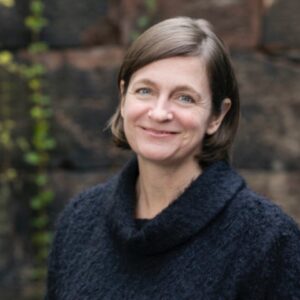
Beauty and Community: Exceptional Landscapes as Public Spaces
Can landscapes of great natural beauty and cultural legacy also become generous public spaces that serve their immediate communities and afford destinations for visitors? How can we interpret and adapt these landscapes to meet contemporary needs? How can we program them appropriately and operate them to ensure they are economically and environmentally sustainable? Beka Sturges of Reed Hilderbrand will address and help answer these questions. Her presentation will provide valuable insights that might be especially helpful as Darien determines next steps for the Great Island property.
Reed Hilderbrand is an American landscape architecture firm recognized for many award-winning projects that have guided the growth and change of significant landscapes from Boston’s 527-acre Franklin Park to Patagonia’s Parque Nacional Corcovado. In addition to private residences and work on university and museum campuses, Reed Hilderbrand works with organizations and communities on strategic and transformative projects. In Cambridge, they have completed an Urban Forest Plan to advance city-wide green infrastructure. They are currently guiding the transformation of a private estate into a new Audubon Society sanctuary on the Concord River and the adaptation of a famous summer camp into a new park and civic center for the Town of Brewster on Cape Cod.
Beka Sturges is partner and principal of Reed Hilderbrand and a senior critic at Yale University School of Architecture. She leads the practice’s office in New Haven. Her projects include the landscapes of The Clark Art Institute in the Berkshires, Storm King Art Center in the Hudson Valley, Dumbarton Oaks in Washington, D.C, and Elizabeth Park in Hartford, Connecticut. In “Beauty and Community” Beka reinterprets contemporary American landscape architecture through the careers of Beatrix Ferrand and Cornelia Hahn Oberlander to arrive at Reed Hilderbrand’s unique design approach to place, community, and beauty. As communities and institutions continue to evolve in the twenty-first century, Beka considers how Connecticut’s diverse landscapes might be best positioned to serve goals of climate resilience, equity, environmental justice — and beauty.
Beka earned her BA in English from Sarah Lawrence College. She began studies towards a PhD in English Literature at Princeton University before earning a Master of Landscape Architecture from the Harvard Graduate School of Design.
Speaker arranged by Richard Grefe
Speaker Summary
Landscape architect Beka Sturges provided an informative and thought-provoking talk about creating beauty in public spaces and then talked about how this process can be applied by Darien as it plans for the development of the Great Island property.
Beka commented on what makes for a beautiful landscape and how its development needs to evolve and endure, then shared examples like The Clark Art Institute and the New Orleans Museum of Art. She talked about how offering a variety of experiences and the quality of the transformation of the space helps make a space deeply loved.
She emphasized that a guiding principle of her firm’s work is identifying and bringing out the one thing that is most distinctive about each piece of land to both ensure it is preserved and emphasized in the development. And that determining what needs to be preserved (and, what does not) is a key first step in any design project.
As Beka moved to thoughts on Great Island, she spoke about the things that contribute to beauty in nature – light, color, stone and texture. She provided some inspiring thoughts about islands and how they embody and inspire things like fantasy, hope and even utopia with examples like Hawaii, Martha’s Vineyard and the nearby Thimble Islands. Beka spoke at some length about the decisions that need to be made about the current structures and some of the considerations involved in deciding which to keep, including historical significance and cost to update and maintain them.
Beka spent a great deal of time in her talk and during the Q&A talking about how critical the process to determine what will be done with a space – especially a public space – needs to be to ensure commitment, arrival at clearly defined “shared values” and buy-in by all constituents. And how a clear, well-defined process and transparent sharing of information and decision-making facilitates this. She also talked to the need to manage the number of decision-makers and how government versus outside resources can be used to ensure a perceived sense of objectivity in the process, as well as leveraging expertise that may not be available within government/local resources.
Finally, she talked about governance and funding models for a spaces like Great Island including public, non-profit and private options and how a combination of them often makes the most sense from a financial perspective.
There was a lengthy Q&A that focused primarily on Great Island and served to expand upon many of the points Beka made during her prepared remarks.
